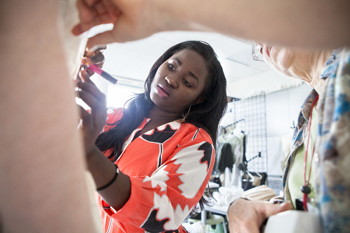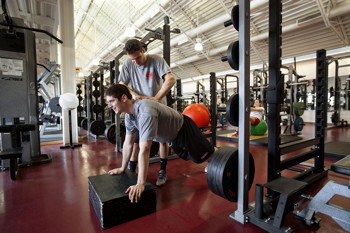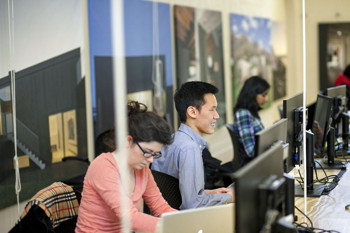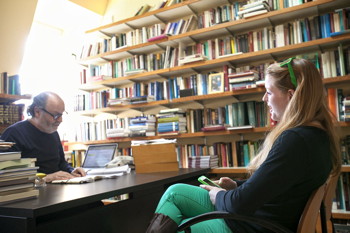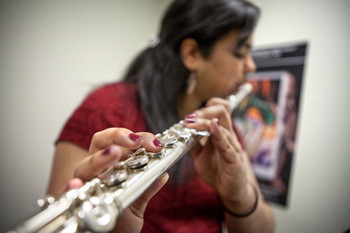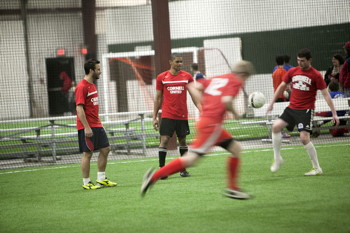COVER STORY
Portraits: Seven extraordinary undergraduates Future leaders of tomorrow (and helpers, chroniclers, heroes, entrepreneurs, designers and thinkers)
Meet seven students who are typical of Cornell undergraduates today – in other words, not typical at all, really.
From speaking to them, we know what this diverse group of people has in common: ambition, confidence in themselves, a deep respect and gratitude for their Cornell professors, and modesty and humility. They all said, in their interviews, something to this effect: "I still have so much I want to learn."
Ezra magazine is happy to catch them at this moment, at the culmination of their undergraduate education, to give you a glimpse into their lives right now, through their own voices.
To read longer portraits of each of these seven students – plus portraits of other fascinating Cornell students, including graduate students, and a growing archive of student and faculty portraits – visit Cornell's Portraits site at cornell.edu/portraits.
Kate Adie
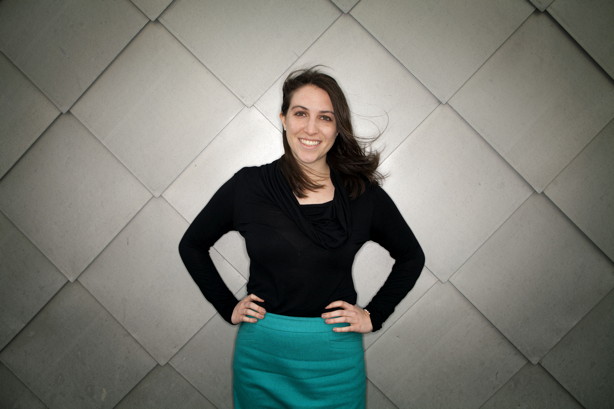
School of Hotel Administration
Cornellian for life
Kate Adie, daughter of two parents in the hospitality industry, has been steeped in hospitality all her life. In 2003 the family moved to Ithaca when her father, Richard "Rick" Adie '75, became the general manager of Cornell's Statler Hotel. As a high school student, Kate began participating in Hotel Ezra Cornell as a volunteer, giving her an intense dose of the school's culture and affirming her decision to follow in her parents' footsteps. At Cornell, she has served on the Hotel Ezra Cornell board of directors and is active with the Hotel School Ambassadors, the Cornell Concert Commission and Kappa Delta sorority.
"[Hotel Ezra Cornell] really is showcasing what the students are doing. Students run everything. We do have advisers – faculty and in the industry – but it's all students. Every year it's something a little bit different and we have the opportunity to put our personal spin on it. We have to keep up with the industry and we're trying to make it attractive for guests to come, so we have to know what's going on and deliver on what they're expecting. The tagline is 'the best ever' … It's a whirlwind weekend. You plan all year just for three days.
"This year I realized that my skills are best suited for training and development. My long-term career goals are going more toward human resources training, so eventually I'd like to be on the corporate side.
"I don't think Cornell is ever going to not be part of my life, especially with the network that is in the Hotel School. Once you're a Hotelie, you're a Hotelie for life."
Matilda Ceesay
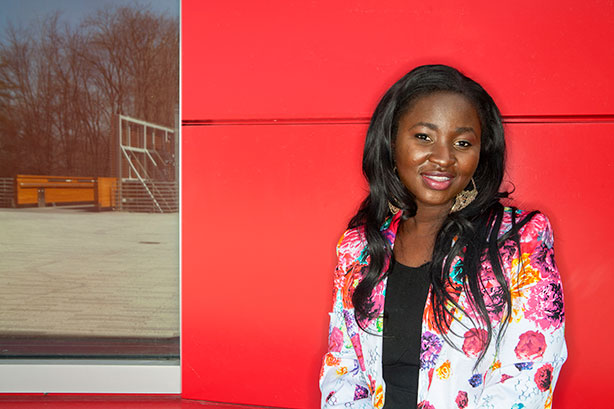
College of Human Ecology
Most likely to make meaningful clothing
Matilda Ceesay is a native of Gambia and grew up in Missouri. Last spring, her collection for the Cornell Fashion Collective attracted the attention of the international press. She had collaborated with a postdoctoral fellow and designed a bodysuit injected with insecticides to protect wearers from malaria-carrying mosquitoes. As someone with relatives who have died of malaria, she cares about fighting this scourge that kills more than half a million people every year in Africa. She also cares, deeply, about fashion. Matilda serves on the Cornell Fashion Collective executive board, and for the past two years she has been a leading student organizer for the Days for Girls organization, a group that provides feminine hygiene kits for young women in developing countries.
"What registers African design as African is based on prints and color. And almost every season, you'll see a Western designer who is inspired by African [design], but it's not as much as of a movement … it's not really its own entity in a way. … Every designer thinks it's his job to revamp African fashion. But the continent is so rich with beauty and inspiration and culture that it shouldn't be revamped. [I] and other designers have a great task in our futures: figuring out what our story is in a way that nobody can tell it better, nobody can question it, and it will last forever."
Nick D'Agostino
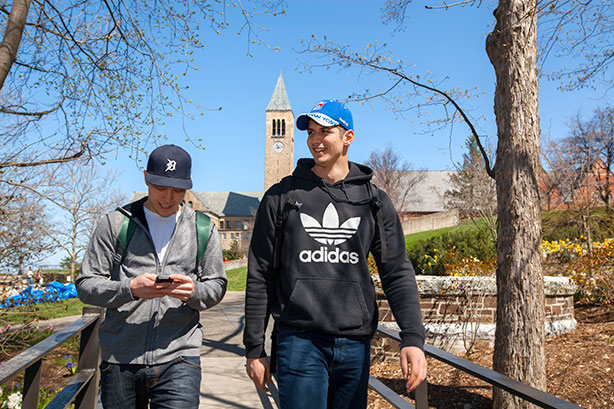
ILR School
Future NHL star
Nick D'Agostino, from Bolton, Ontario, is one of the nation's top point-producing defensemen in ice hockey. He was drafted in 2008 by the Pittsburgh Penguins, whom he'll join after graduation. When his hockey career winds down, he hopes to attend law school.
"You know, there's a saying in hockey: The difference between being good and being great is very small. When it comes down to it, the great hockey players, they pay attention to the small details so well, in their professionalism, their day-to-day work ethic, how you come to the rink, working hard trying to get better every single day. Your habits, even away from the rink, how you're eating, how you're sleeping. And when you're talking in-game stuff, to be detail-oriented is pretty important in hockey.
"Working with Cornell and [head coach] Mike Schafer, I've made great strides over four years. … My classmates here have been awesome. … You spend so much time with them that obviously they become so influential – in the person you become and the hockey player you become. We love hockey. You know, we don't just talk hockey at the rink, we talk hockey all day.
Martin Leung
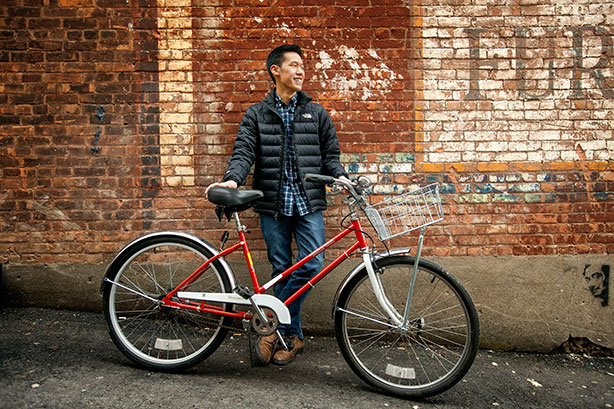
College of Architecture, Art and Planning
Hoping to create a lasting urban legacy
Frank and Rosa Rhodes Scholar Martin Leung's interest in urban planning and real estate stems from his childhood in Hong Kong and rural Oregon where he experienced drastic differences in people, culture and physical environment. As part of the Cornell in Washington program, he interned at the White House Council on Environmental Quality where he incorporated sustainable practices into government operations. He also has studied at the College of Architecture, Art and Planning's Cornell in Rome program, worked on several city and project planning teams in upstate New York, and interned with the World Trade Center redevelopment team.
On campus, Leung helped launch Big Red Bikes, a bike share system that grew its membership from zero to more than 1,800 (students, staff and faculty) in five months. Today, membership exceeds 3,000.
"Having been in so many internships I've seen how you can pursue making cities a better place in a lot of different ways. Obviously policy is very important. Real estate is a big part of it, as is planning and architects. … There's a lot that the public and private sector can learn from each other, and there really needs to be a lot more collaboration.
"So being able to build an organization, whether it be a business, like a bike share, or a nonprofit, I think that's my long-term goal: [to] build something that really outlasts me and be a positive change agent. Come back to me in 20 or 30 years and we can talk about it."
Emily Koppelman
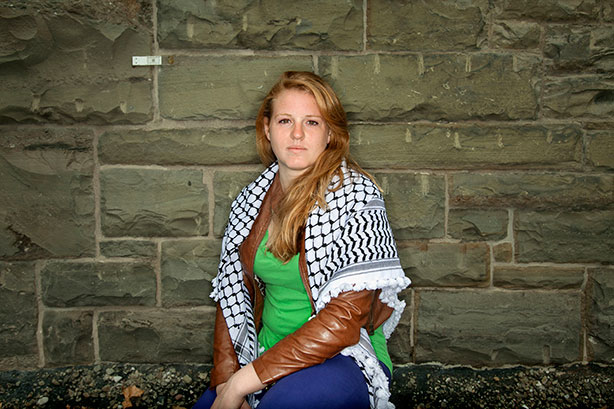
College of Arts and Sciences
Future war correspondent
Emily Koppelman is a senior Near Eastern studies major with a 4.091 GPA. She is fluent in Spanish and Arabic and is now taking Persian. She's been a member of the track team since freshman year and has traveled extensively in Jordan and Egypt.
"In January, I was in Jerusalem. There was a Palestinian tent village that was erected in protest to the Israeli settlement project. The Israeli Defense Forces had closed off all the entrances to the mountain that this village was on to prevent the press and protesters from getting there, so we wound up parking the car on the highway and hiking about 10 kilometers to get there. I was there for seven hours, and I ended up on Palestinian national television, because it was such a novelty to have someone like me who is fluent in the dialect and has these political views that are so rare among Westerners. I shouldn't be a rarity.
"I admire most those people who are willing to put their lives on the line to get the story people want to cover up. Places like Syria, places like North Africa, where there is intercommunal violence going on, those are the places that really need a voice to express the suffering of the people. I can't speak for anyone else, but I'm definitely willing to go and be one of the people on the ground."
Sharmila Jai Kumar
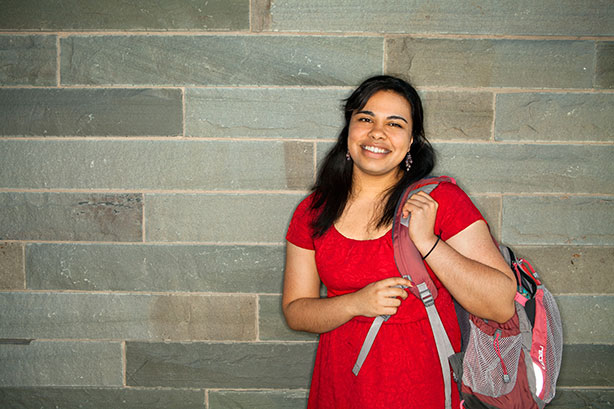
College of Agriculture and Life Sciences
Most likely to save your life, or just help you along the way
A transfer student, Sharmila Jai Kumar was born in Bangalore, India. After transferring to Cornell from the University of Massachusetts-Amherst for her sophomore year of college, Kumar earned a myriad of honors, awards and grants and traveled abroad to help others. She currently works on cutting-edge sleep research in Professor Joseph Fetcho's neurobiology and behavior lab and serves in a half dozen service roles on and around campus.
"There's a lot of impersonality [in the American health care system]. It's rushed. You go to a doctor and you have 10 minutes to spill out six months' worth of health issues and six of them might be resolved and the others might not be. You don't really have an opportunity to know your doctor on a personal level, so you don't really build a trusting relationship with them. I want to try really hard to not be that kind of doctor, because I think it's a much more worthwhile profession when you know your patients. Then you feel like you'd do anything for them and you have that strong relationship with them. … It makes patients want to open up and have their doctor access their health as a whole, as a human being.
"I've been helped a lot, not only at Cornell, but throughout my life growing up. … I feel like the best way of saying thank you to all the people who helped me is to just pay it forward."
Larry Slaughter
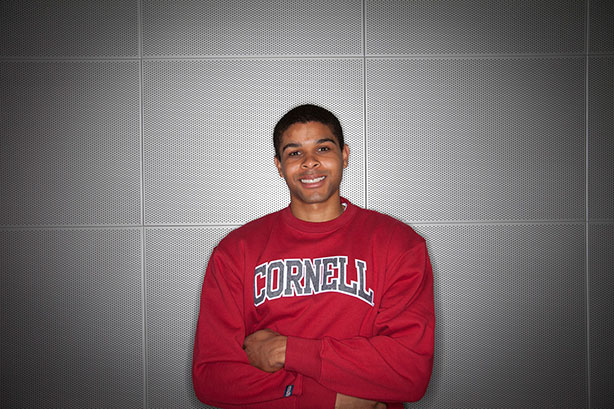
College of Engineering
Going where his interest, and engineering solutions, lead him
Larry Slaughter, a native of Beachwood, Ohio, is a Kessler Fellow, a Louis Stokes Alliance for Minority Participation Scholar and a Jacobs Scholar. He is a mechanical and aerospace engineering major; a founding member of the Cornell chapter of WAVES for Development, a microfinance organization that raises money to install solar panels and for sustainability and water purification work in Peruvian communities; and was a finalist at Entrepreneurship@Cornell's Big Idea Competition for the website careerXPLORE. He is also president of Cornell United Men's Club Soccer.
"I really had no idea which type of engineering I wanted to do because it's such a broad topic.
"I never thought I wanted to do research, or was interested in sustainable design, [but] I tried it and liked it. And then I never knew about entrepreneurship, but I had an opportunity to jump into that, and I did it. … My experience has been very random, but I've loved the randomness of it and how things have worked out.
"I'm going to be working for Accenture.com for systems integration consulting. As a consultant, you work with so many different companies, you're able to see so many different industries; so I want to use that as a way to find out where I should enter as an entrepreneur. Where I can see, 'Oh, there's a great opportunity with this company to fix this problem.'"

